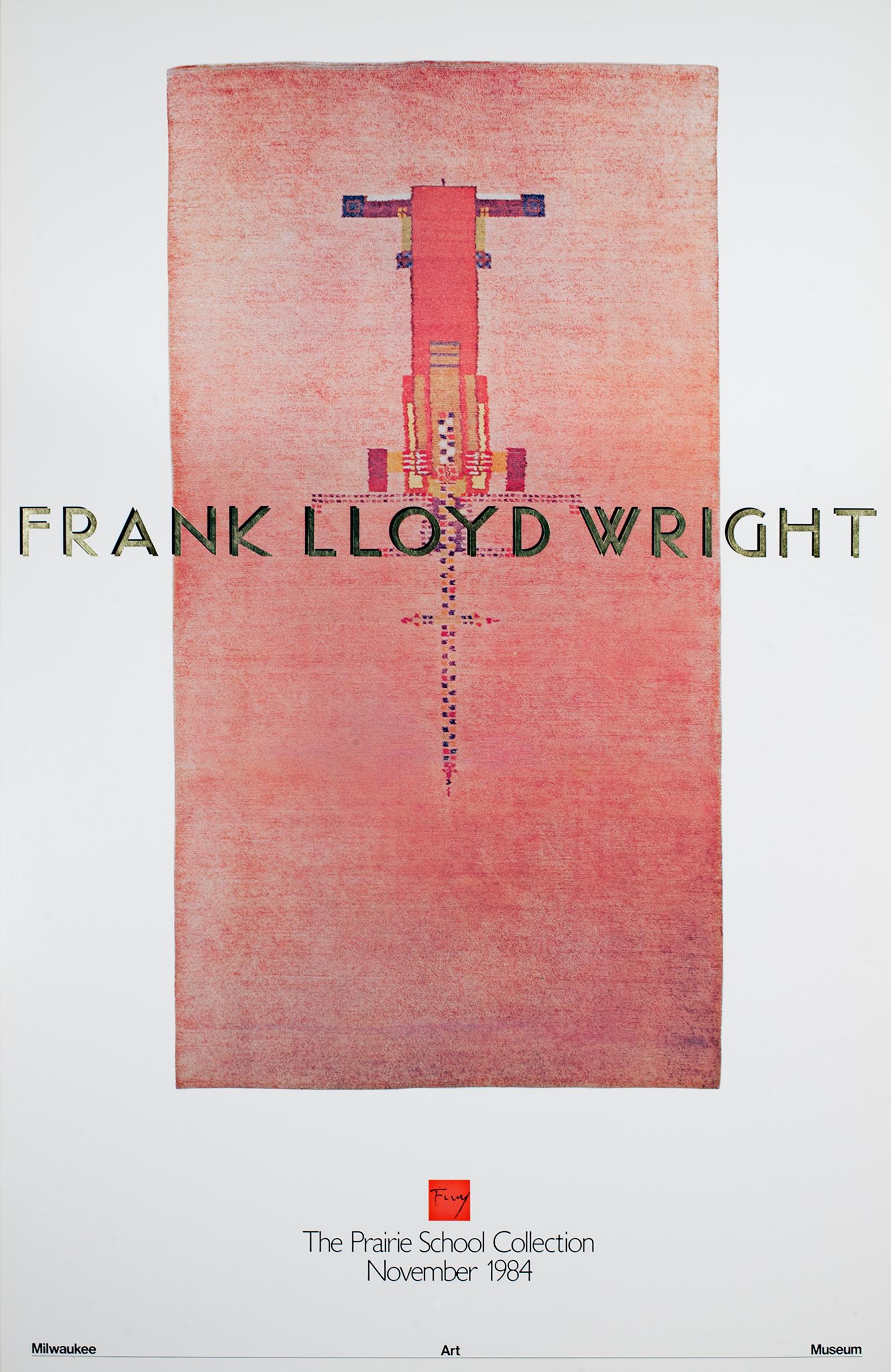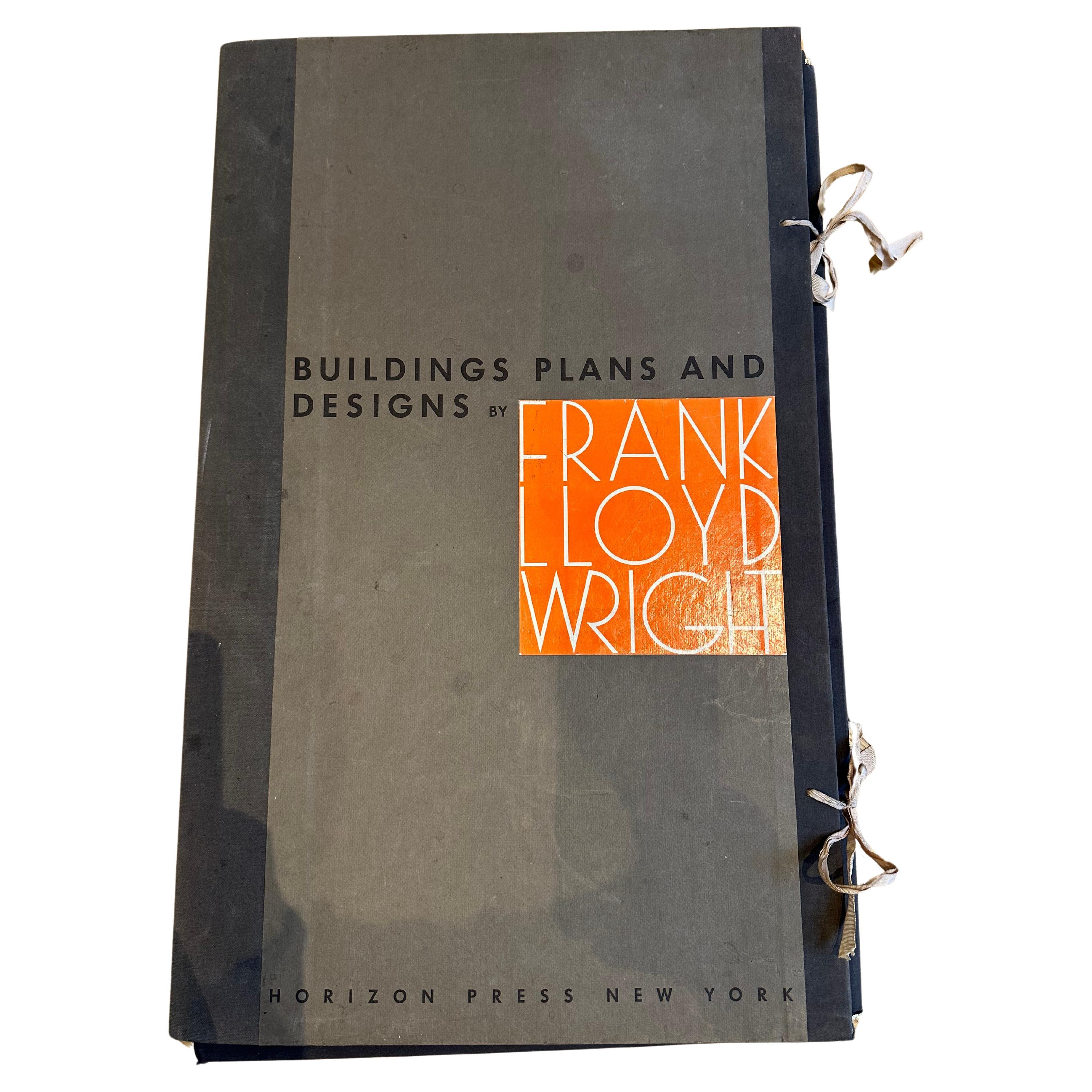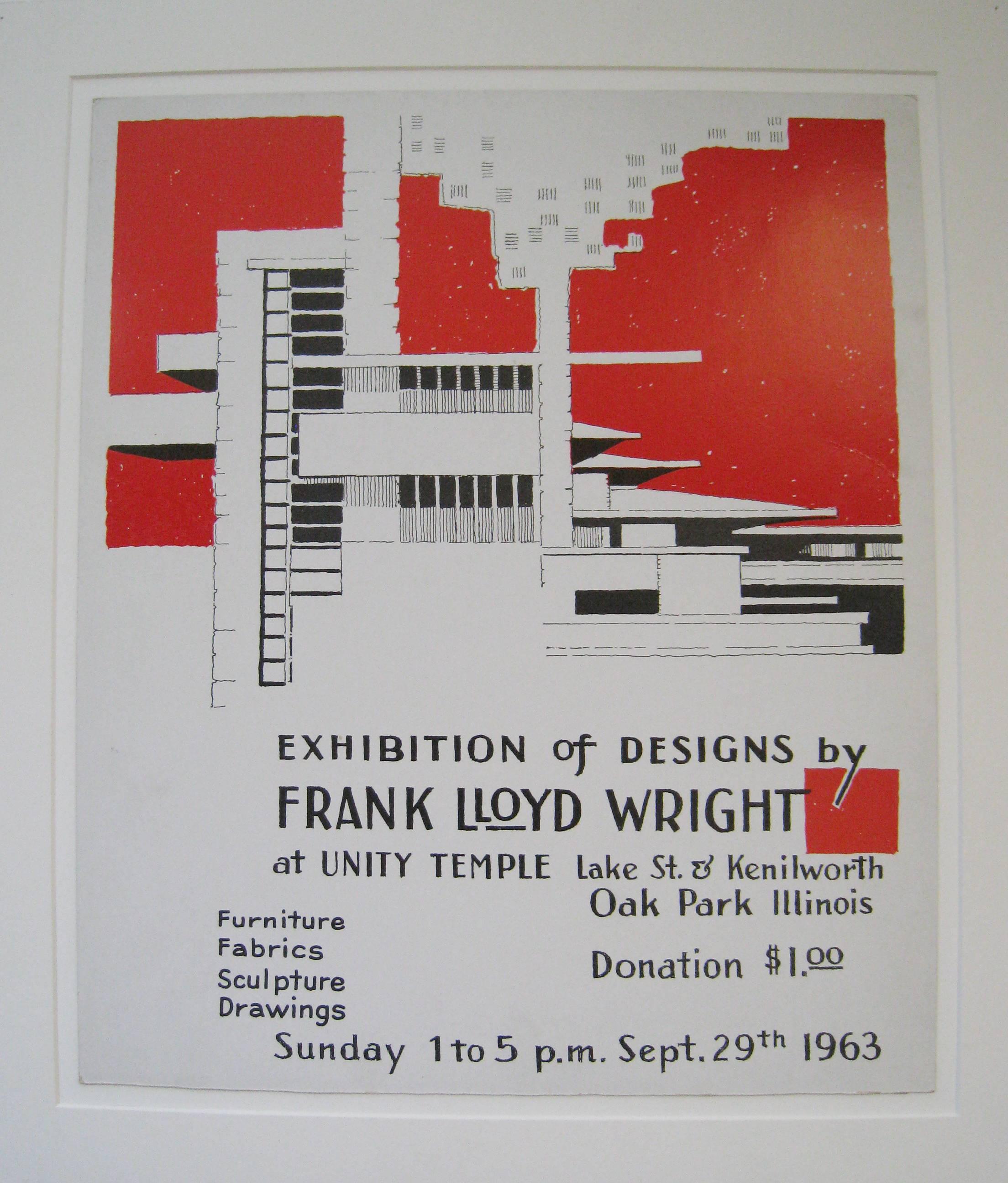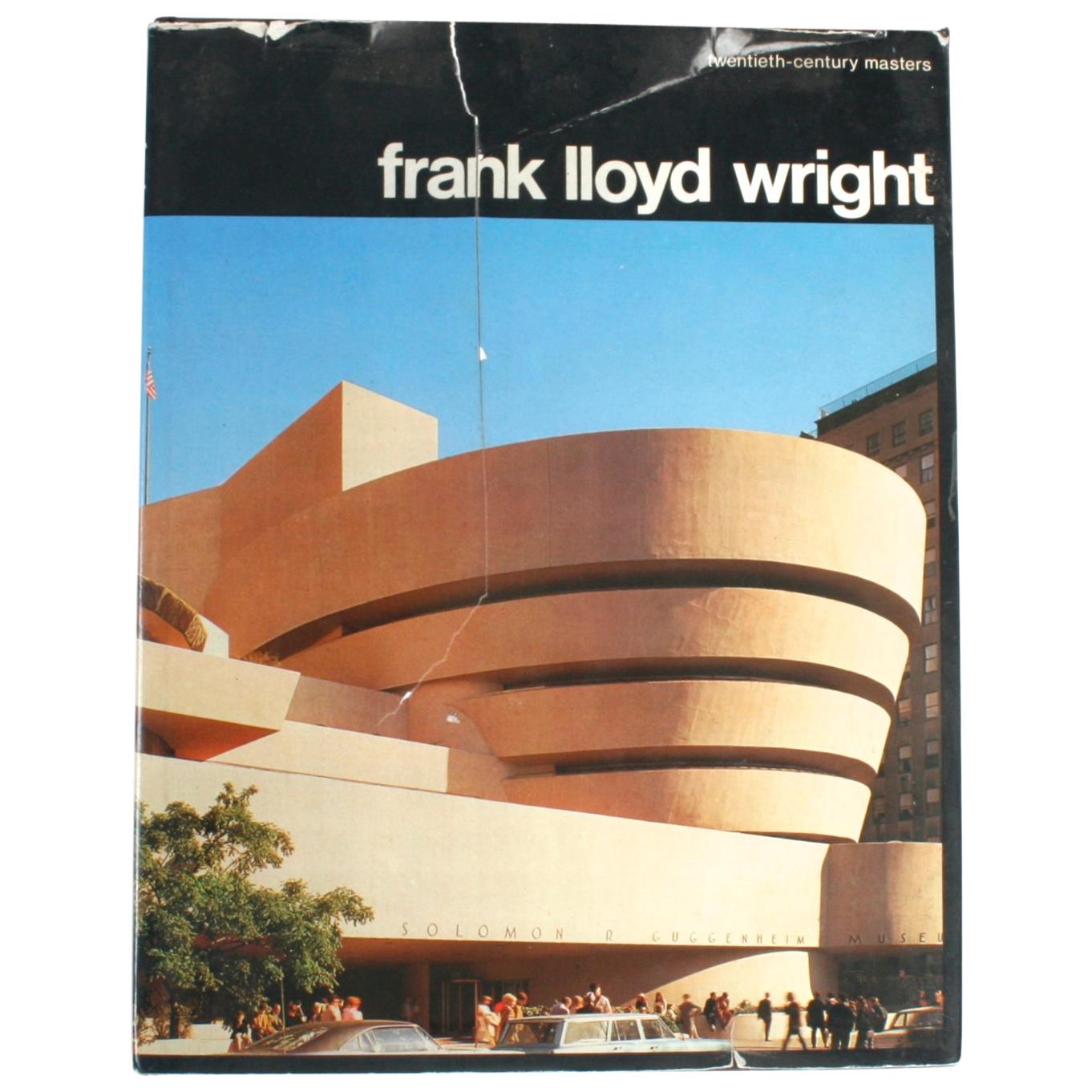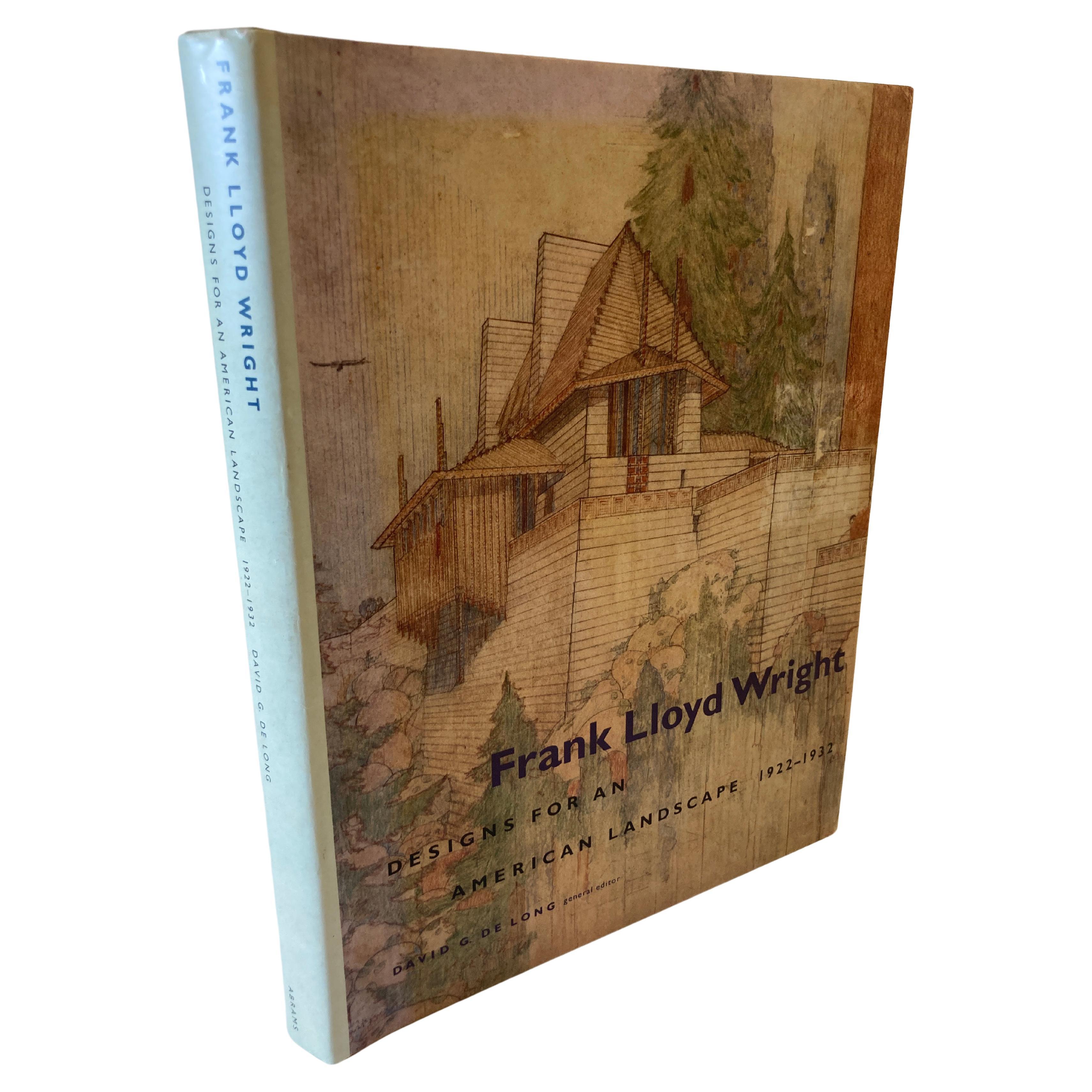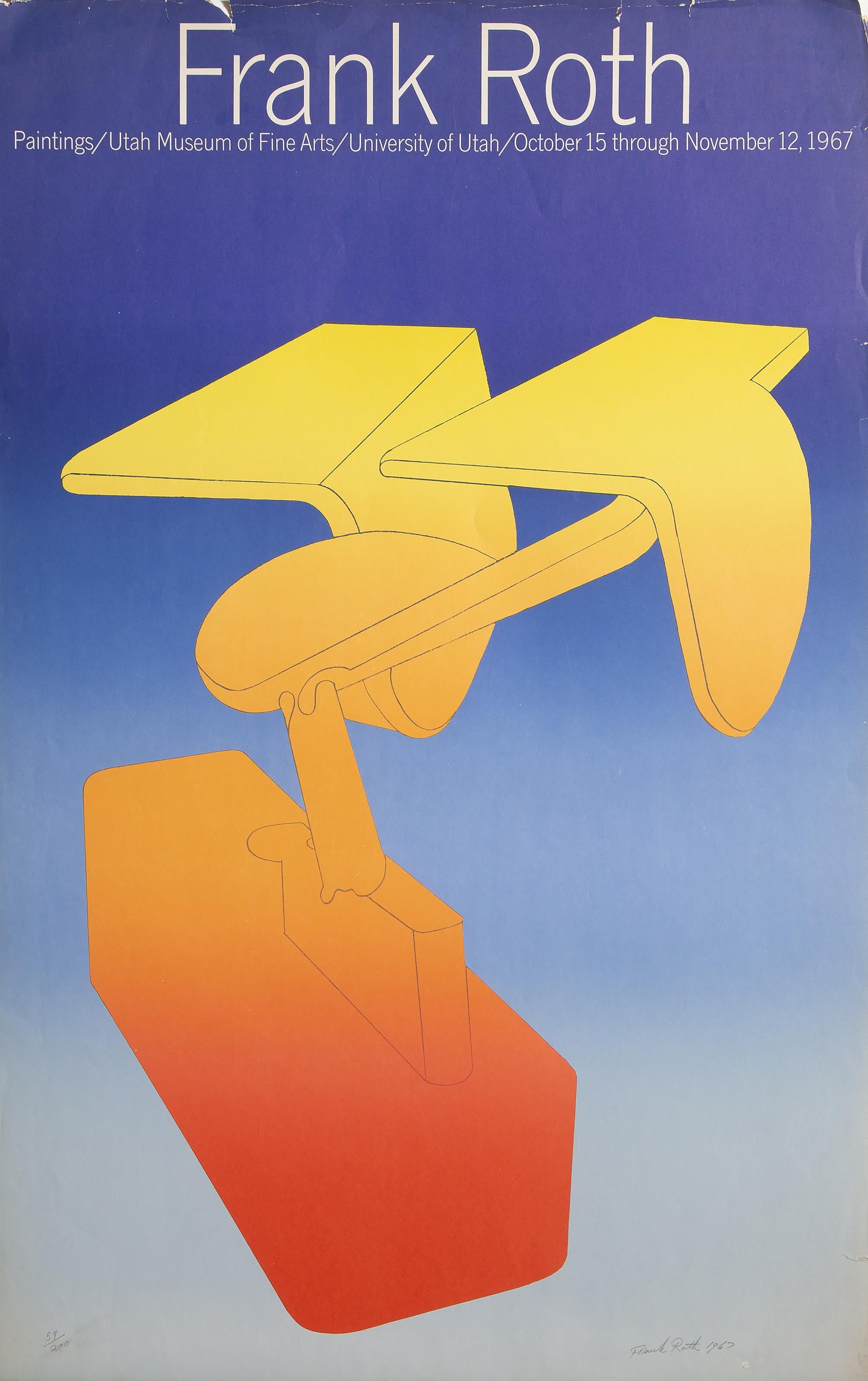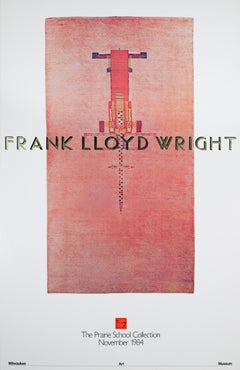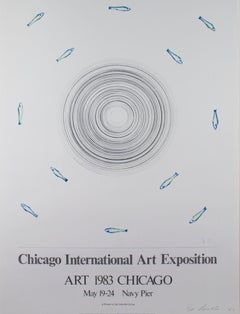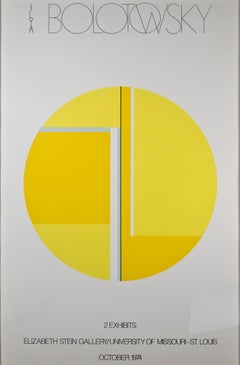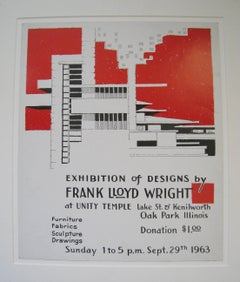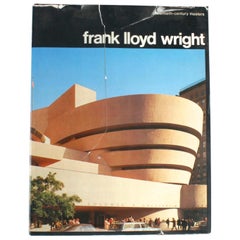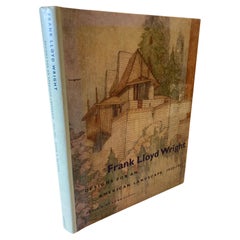Items Similar to 'The Prairie School Collection' exhibition poster Milwaukee Art Museum
Video Loading
Want more images or videos?
Request additional images or videos from the seller
1 of 10
'The Prairie School Collection' exhibition poster Milwaukee Art Museum1984
1984
$2,400
£1,839.77
€2,105.77
CA$3,428.30
A$3,759.79
CHF 1,947.31
MX$45,176.86
NOK 24,521.25
SEK 23,013.89
DKK 15,732.07
About the Item
This poster, produced for an exhibition at the Milwaukee Art Museum, features the bold work of American architect and designer Frank Lloyd Wright. Beneath the gold foil letters of Wright's name is a plate he designed for Midway Gardens. Midway Gardens, which only stood between 1914 and 1929, was an entertainment facility on the south side of Chicago. As Wright often did, he designed every part of the space from the building itself to the plates on the table. This plate features simple black lines and squares of color, motifs that can also be seen in, for example, his stained glass designs.
34.88 x 22 inches, poster
36 x 23 inches, frame
Type: Peter A. Altenhofen Typographers, Inc.
Separations: Pro Graphics, Inc.
Printing: Wetzel Bros, Inc.
Photo Materials: Pallas
Photography: John Payne
Retouching: Kent Mueller
Calligraphy: McDill Advertising/Design
Framed to conservation standards using archival materials including 100 percent rag mounting materials, UV5 Plexiglas to inhibit fading, and housed in an oak moulding.
Overall good condition; some specked staining throughout; frame in good condition.
Frank Lloyd Wright was born in Richland Center, Wisconsin on June 8, 1867. His parents, William Cary Wright and Anna Lloyd-Jones, originally named him Frank Lincoln Wright, which he later changed after they divorced. When he was twelve years old, Wright's family settled in Madison, Wisconsin where he attended Madison High School. During summers spent on his Uncle James Lloyd Jones' farm in Spring Green, Wisconsin, Wright first began to realize his dream of becoming an architect. In 1885, he left Madison without finishing high school to work for Allan Conover, the Dean of the University of Wisconsin's Engineering department. While at the University, Wright spent two semesters studying civil engineering before moving to Chicago in 1887.
In Chicago, he worked for architect Joseph Lyman Silsbee. Wright drafted the construction of his first building, the Lloyd-Jones family chapel, also known as Unity Chapel. One year later, he went to work for the firm of Adler and Sullivan, directly under Louis Sullivan. Wright adapted Sullivan's maxim "Form Follows Function" to his own revised theory of "Form and Function Are One." It was Sullivan's belief that American Architecture should be based on American function, not European traditions, a theory which Wright later developed further. Throughout his life, Wright acknowledged very few influences but credits Sullivan as a primary influence on his career. While working for Sullivan, Wright met and fell in love with Catherine Tobin. The two moved to Oak Park, Illinois and built a home where they eventually raised their five children. In 1893, Sullivan and Wright ended their business relationship. Wright opened his own firm in Chicago, which he operated there for five years before transferring the practice to his home in Oak Park.
Wright's early houses revealed a unique talent in the young, aspiring architect. They had a style all their own, mimicking that of a horizontal plane, with no basements or attics. Built with natural materials and never painted, Wright utilized low-pitched rooflines with deep overhangs and uninterrupted walls of windows to merge the horizontal homes into their environments. He added large stone or brick fireplaces in the homes' heart, and made the rooms open to one another. His simplistic houses served as an inspiration to the Prairie School, a name given to a group of architects whose style was indigenous of midwestern architecture. Later he became one of its chief practitioners. Some of his most notable creations include the Robie House in Chicago, Illinois and the Martin House in Buffalo, New York.
In 1909, after eighteen years in Oak Park, Wright left his home to move to Germany with a woman named Mamah Borthwick Cheney. When they returned in 1911, they moved to Spring Green, Wisconsin where his mother had given him a portion of his ancestors' land; it was the same farm where he had spent much time as a young boy. In Spring Green he constructed Taliesin. They lived there until 1914 when tragedy struck. An insane servant tragically murdered Cheney and six others, then set fire to Taliesin. Many people thought this horrific event would be the end of Wright's career. He proved them wrong however, with his decision to rebuild Taliesin.
Over the next 20 years Wright's influence continued to grow in popularity in the United States and Europe. Eventually his innovative building style spread overseas. In 1915, Wright was commissioned to design the Imperial Hotel in Tokyo. It was during this time that Wright began to develop and refine his architectural and sociological philosophies. Because Wright disliked the urban environment, his buildings also developed a style quite different from other architects of the time. He utilized natural materials, skylights and walls of windows to embrace the natural environment. He built skyscrapers that mimicked trees, with a central trunk and many branches projecting outward. He proclaimed that shapes found in the environment should be not only integrated, but should become the basis of American architecture. A great example is the Larkin Company Administration Building in Buffalo, New York (1903), and the Guggenheim Museum in New York City (1943), which resembles the structure of a shell or a snail.
In 1932, Wright opened Taliesin up as an architectural fellowship where young students could pay to work with and learn from him. Thirty apprentices came to live with him at Taliesin. Through the Taliesin Fellowship, Wright created masterpieces such as Fallingwater (the Kaufmann House) in Mill Run, Pennsylvania, and the SC Johnson and Son Wax Company Administration Center in Racine, Wisconsin. During this time, he married and separated from Miriam Noel and met his third wife, Olivanna Milanoff. The two lived happily at Taliesin for five years and raised a child there. As the couple grew older, the Wisconsin winters became too much for them. In 1937, Wright moved his family and fellowship to Phoenix, Arizona where he built Taliesin West and spent the last twenty years of his life.
At Taliesin West, because of the comfortable year-round climate, Wright was able to integrate the outdoors with his indoor spaces. He designed high sloping roofs, translucent ceilings, and large, open doors and windows that created a subtle distinction between the home and the environment. Both Taliesin and Taliesin West were continuous living experiences for Wright as they constantly remained under construction. As his fellowship grew and the need for a larger facility became necessary, Wright continued to create additions and expansions on both homes.
On April 9, 1959 at age ninety-two, Wright died at his home in Phoenix, Arizona. By the time of his death, he had become internationally recognized for his innovative building style and contemporary designs. He had created 1,141 designs, of which 532 were completed. His name had become synonymous with great design, not only because of the form of his designs, but also because of the function. In the end, he showed not just what to live in, but more importantly he influenced the very nature of how we lived.
- Creation Year:1984
- Dimensions:Height: 36 in (91.44 cm)Width: 23 in (58.42 cm)
- Medium:
- Movement & Style:
- After:Frank Lloyd Wright (1867 - 1959, American)
- Period:
- Condition:Overall good condition; some specked staining throughout; frame in good condition.
- Gallery Location:Milwaukee, WI
- Reference Number:Seller: 9593g1stDibs: LU60536611462
About the Seller
4.9
Gold Seller
Premium sellers maintaining a 4.3+ rating and 24-hour response times
Established in 1966
1stDibs seller since 2017
451 sales on 1stDibs
Typical response time: 2 hours
- ShippingRetrieving quote...Shipping from: Milwaukee, WI
- Return Policy
Authenticity Guarantee
In the unlikely event there’s an issue with an item’s authenticity, contact us within 1 year for a full refund. DetailsMoney-Back Guarantee
If your item is not as described, is damaged in transit, or does not arrive, contact us within 7 days for a full refund. Details24-Hour Cancellation
You have a 24-hour grace period in which to reconsider your purchase, with no questions asked.Vetted Professional Sellers
Our world-class sellers must adhere to strict standards for service and quality, maintaining the integrity of our listings.Price-Match Guarantee
If you find that a seller listed the same item for a lower price elsewhere, we’ll match it.Trusted Global Delivery
Our best-in-class carrier network provides specialized shipping options worldwide, including custom delivery.More From This Seller
View AllLate 20th century color lithograph prairie style Frank Lloyd Wright architecture
By Frank Lloyd Wright
Located in Milwaukee, WI
"The Prairie School Collection - Rug" is an offset lithograph poster with gold foil. This piece advertises an exhibition of Frank Lloyd Wright's designs. Unsigned.
34 7/8" x 22" art...
Category
1980s American Modern Abstract Prints
Materials
Offset
"Chicago International Art Exhibition, " Abstract Exhibition Poster
By Ed Ruscha
Located in Milwaukee, WI
"Chicago International Art Exhibition" is a color poster after Ed Ruscha, autographed and dated lower right. The artists initials are also in the lower ...
Category
1980s Pop Art Abstract Prints
Materials
Offset
"Elizabeth Stein Gallery" Lithograph Exhibition Poster
By Ilya Bolotowsky
Located in Milwaukee, WI
"Elizabeth Stein Gallery A/P" is a color lithograph poster. This piece features an abstract and geometric design in yellow.
Unsigned.
40" x 26"
Born in Russia in 1907, Ilya Bolotowsky left his native country in his early childhood. The family was forced to emigrate as a result of his parent’s anti-Communist sentiments. They traveled first to Constantinople, then settled in New York City in 1923. Bolotowsky enrolled at the National Academy of Design in 1924. He tried out many styles in this period, ranging from the representational and classical to the abstract and expressionistic. In the early 1930s he became a designer of textiles. In 1932 Bolotowsky spent ten months in Europe. Although he was already familiar with prevailing modernist movements, the opportunity to study a wide range of these works and to meet some of the artists who had made them affected Bolotowsky profoundly. As a result of this trip, Bolotowsky began to synthesize aspects of Cubism with the abstract Surrealism of artists like Miro and Arp. These softer, floating forms gave way to a rectilinear geometry as he became more influenced by the Constructivists and Mondrian. Upon his return to the United States, Bolotowsky married his fellow painter Esphyr Slobodkina...
Category
1970s Abstract Geometric Abstract Prints
Materials
Lithograph
"Milwaukee Reads--Harry W. Schwartz Bookshop, " Silkscreen Poster by Arnold Gore
By Arnie Gore
Located in Milwaukee, WI
"Milwaukee Reads - Harry W. Schwartz Bookshop" is a silkscreen poster for a bookshop in Milwaukee, Wisconsin. The illustrator Arnold (Arnie) Gore designed it a...
Category
1980s Modern Prints and Multiples
Materials
Screen
"Orient-Express, " Colored Lithograph Poster signed by Pierre Fix-Masseau
By Pierre Fix-Masseau
Located in Milwaukee, WI
"Orient-Express" is a lithograph poster by Pierre Fix-Masseau. It depicts two people dining and being served drinks on a luxury train. The artist signed the artwork in the image lower right. There was a small tear on the margin that has been repaired.
38 5/8" x 24 1/4" art
40 1/2" x 26" frame
French Poster...
Category
1980s Art Deco Figurative Prints
Materials
Lithograph
Early 20th century color lithograph poster mountain building trees sky text
By Edouard-Georges Mac-Avoy 1
Located in Milwaukee, WI
"Perigord" is an original lithograph of a landscape created for the Societe Nationale des Chemis de fer Francais, the French National Railways. Artist Eduoard Georges Mac'Avoy worked...
Category
1940s Landscape Prints
Materials
Lithograph
You May Also Like
Frank Lloyd Wright Buildings Plans and Designs - Large Plate Lithographs
By Frank Lloyd Wright Foundation
Located in Espoo, FI
This is an enormous booklet (25.75 X 16 Inches): Frank Lloyd wright buildings, plans and designs. 96 Large scale plate drawings and plans on quality wove p...
Category
Vintage 1960s American Prints
Materials
Paper
$3,776 Sale Price
35% Off
Exhibition of Designs by Frank Lloyd Wright at Unity Temple. Lake St. Kenilworth
By Alfonso Iannelli
Located in New York, NY
i
Exhibition of Designs by Frank Lloyd Wright at Unity Temple. Lake
St. Kenilworth, Oak Park. (Published by the Chicago Heritage Committee with the Cooperation of the Unitarian Unive...
Category
1960s American Modern Abstract Prints
Materials
Offset
Frank Lloyd Wright by Marco Dezzi Bardeschi
Located in valatie, NY
Frank Lloyd Wright (20th Century Masters Series) by MarCo Dezzi Bardeschi. Hardcover with dust jacket. 94 pp. 44 color illustrations on double sided plates and 33 b/w illustrations. ...
Category
Vintage 1970s English Books
Materials
Paper
Frank Lloyd Wright: Designs for an American Landscape, 1922-1932 Book
By (after) Frank Lloyd Wright
Located in Moreno Valley, CA
Frank Lloyd Wright: Designs for an American Landscape, 1922-1932.
Anne Whiston Spirn, David Gilson De Long
Thames and Hudson, 1996 - Organic architecture - 207 pages. Hardcover book.
During the 1920s Frank Lloyd Wright designed five projects, none of which were ever built, but which were architectural prototypes...
Category
20th Century American Bauhaus Books
Materials
Paper
Paintings/Utah Museum of Fine Arts, Modern Poster by Frank Roth
By Frank Roth
Located in Long Island City, NY
Frank Roth, American (1936 - ) - Paintings/Utah Museum of Fine Arts, Year: 1967, Medium: Poster, signed, numbered and dated in pencil, Edition: 59/200, Size: 37 x 23.5 in. (93.98 x...
Category
1960s Modern Prints and Multiples
Materials
Offset
Frank Lloyd Wright by Bruce Brooks Pfeiffer Hardcover Book
By Frank Lloyd Wright
Located in Moreno Valley, CA
Frank Lloyd Wright by Bruce-brooks-pfeiffer. Hardcover book.
Published by Barnes Noble Books (1994).
A building by Frank Lloyd Wright (1867-1959) is at once unmistakably individual, ...
Category
1990s American Mid-Century Modern Books
Materials
Paper
More Ways To Browse
Stained Glass Windows And Doors
Old Couple
Vintage Skylights
Frank Lloyd Wright Milwaukee Art Museum
Frank Lloyd Wright Collection
36 Inch Round Side End Table
Frank Lloyd Wright Table Midway
Jean Choiselat
Jenny Holzer Postcard
Jose Morell
Joy Lane
Karl Klein
Kenneth Steel Art
Lake Garda Vintage Poster
Lela Bliss
Lennon Woman
Levi Andy Warhol
Li Sheng
